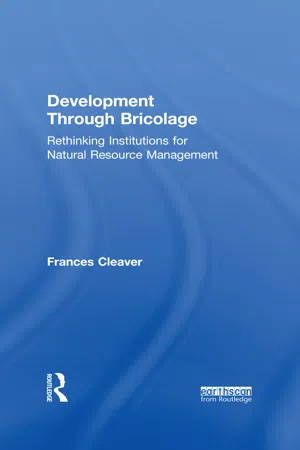This book explores the ways in which institutions mediate relationships between people, natural resources and society. It aims to animate theory by showing just how the interaction between social structure and individual agency works through institutions. My primary focus is not on designing institutions for better resource management (already the subject of an impressive literature), but rather on understanding how institutions work in practice and consequently why the outcomes benefit some people and exclude others. This book raises the questions we need to ask if institutions tasked with natural resource management are also to promote equity of access and distribution, to further social justice.
Local institutions as the building blocks of ‘good’ governance?
‘Getting institutions right’ has become central to development policy in a number of ways. A curious amalgamation of policy ideas paradoxically link market reforms and the individualization of property rights to decentralization and community-based development (Peters, 2004; Osei-Kufuor, 2010). In such approaches, institutions are the channels through which individual and collective action is shaped, social capital built and the weaknesses of state or market provision redressed (Merrey et al., 2007; Osei-Kufuor, 2010). Robust local institutions are seen as fundamental to good governance and democracy, providing the spaces through which people express their needs and call representatives or service providers to account (Putnam, 1994; Cornwall, 2004; Houtzager and Lavalle, 2009). The current international policy consensus in the area assumes that institutions with clear roles, rules and lines of accountability will help to shape desirable governance arrangements of transparency, accountability and probity (Asian Development Bank, 1999; McGranahan and Satterthwaite, 2006; Grindle, 2007). My argument in this book, however, is that these desirable outcomes are not at all assured and that we need to understand why this is if we aim to attain them through development interventions.
This focus on designing the correct institutional arrangements to further good governance and development strongly influences policy approaches concerned with natural resource management at the local level. Here, well-designed institutions are seen as critical to regulating land rights, preventing degradation and depletion of resources (forests, fisheries, rangelands, wildlife, water), managing common property and creating sustainable livelihoods (Woodhouse, 2002). Mainstream approaches suggest that resource management can be strengthened through policy reform, capacity building, and particularly through redesigning community-level institutions so as to provide incentives to cooperate (Varughese and Ostrom, 2001; Heikkila et al., 2011).
Ideas about the inefficiencies of the state, the efficacy of local knowledge and action and the need to regulate individual behaviour are combined in a number of interlinked assumptions (see also Blaikie, 2006). Firstly, it is often asserted that communities can most effectively manage natural resources as they are best placed to monitor resource use and so deal with ‘open access’ problems of overuse. It is argued that they have an advantage in efficient resource use and allocation, being able to draw on their local knowledge of resources, environmental conditions and technology (Cinner, 2011; Ostrom, 2008). Secondly, community management is thought to be pro-poor. The claims are that local institutions can specify a place for marginalized people in decision-making, community norms often include the right for a living for all, and labour-intensive resource management activities may generate economic benefits. Thirdly, community management is seen as contributing to a virtuous cycle of ‘good governance’, so mitigating state failure. According to this view, it is through participation that people express their needs, call service providers to account and challenge corrupt practices. Fourthly, it is assumed that local traditions of cooperation provide the building blocks of good resource management, but often lack robustness due to informality and lack of clarity in rights incentives and authority structures. Policy approaches to rectify this ‘institutional deficit’ include formalization and codification of property rights and governance arrangements (for example, in relation to land tenure, see World Bank, 2001: 35–7, quoted in Sturgeon and Sikor, 2004). However, as will be illustrated in this book, this set of linked assumptions does not necessarily hold in practice and the related policy emphases may be misguided. Approaches to implementing local-level resource management tend to overlook the complex and changing interactions amongst community members, the state and service providers; to underestimate the dynamic nature of institutional governance in socio-economic systems (Huppert, 2008; Cleveringa et al., 2009).
Local resource management and its limits
The policy approach outlined above advocates the proper design of local participatory institutions for good natural resource governance. However, there is also a significant literature critiquing participatory approaches in development and community-based management of natural resources in particular. In this it is argued that the costs and benefits of such public participation are not evenly spread, and furthermore that some people find it more difficult to shape the communal rules than others. This literature is therefore more cautious about assuming that local governance will lead to ‘good’ governance and is concerned with the limits of decentralization, with unpacking over-romantic ‘myths’ of community and with the equity effects of local institutional arrangements (Agrawal and Gibson, 1999, 2001; Campbell et al., 2001; Cooke and Kothari, 2001; Mtisi and Nicol, 2003; Cleaver et al., 2005; Osei-Kufuor, 2010; Wong, 2010). Such questioning is compatible with critical social justice perspectives, which see the mainstream policy concerns with equality of opportunity in livelihood generation as too restricted (Morvaridi, 2008). Instead, advocates of critical social justice analyze the ways that power exercised through societal relationships produces unequal outcomes, and how this can be addressed through the broader redistribution of resources rather than just tinkering with the redesign of local institutions.
By way of introducing some of this more critical thinking on the institutions and community management, consider this sketch of the evolution of one village’s water supply scheme (for a more detailed elaboration see Cleaver and Toner, 20061).
